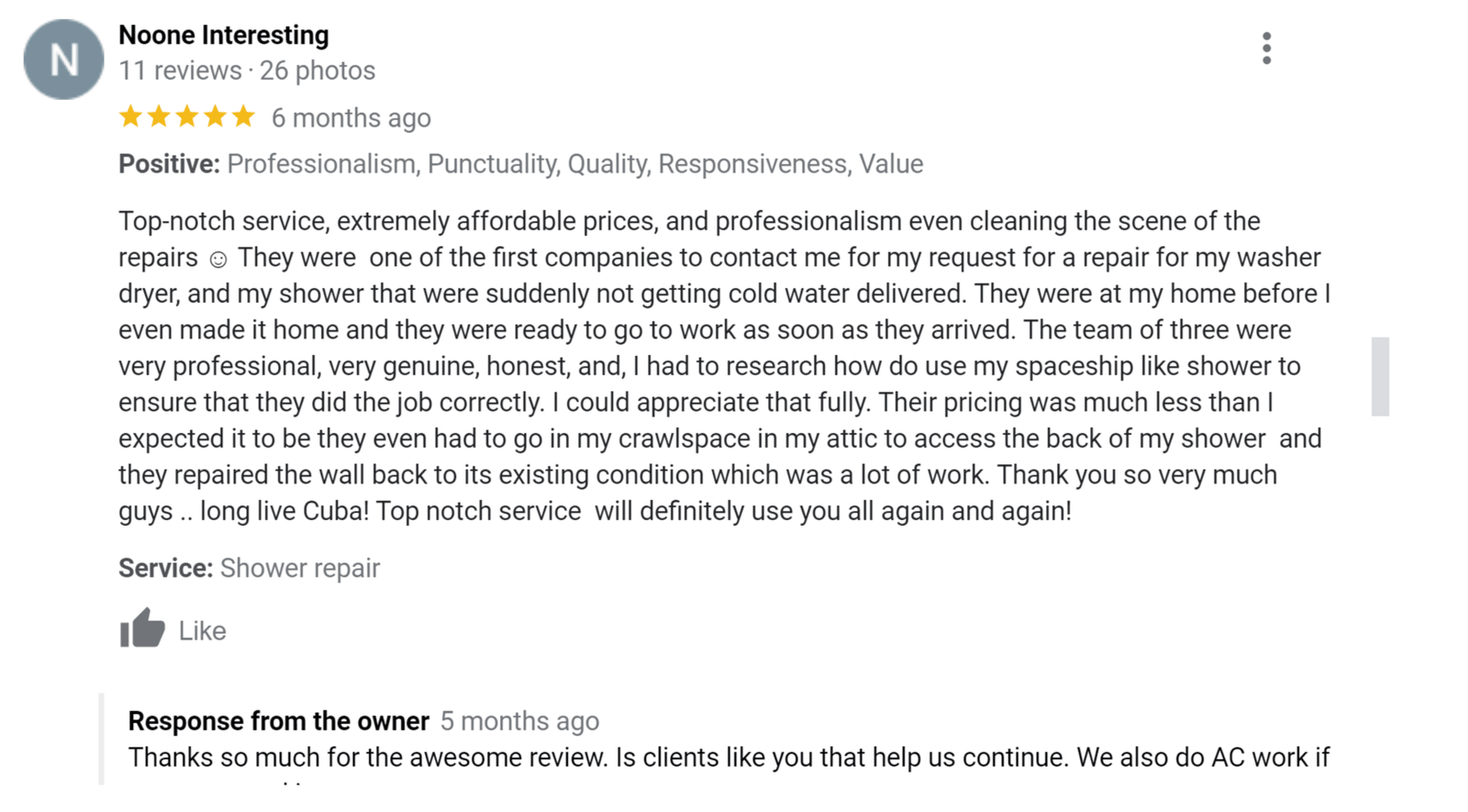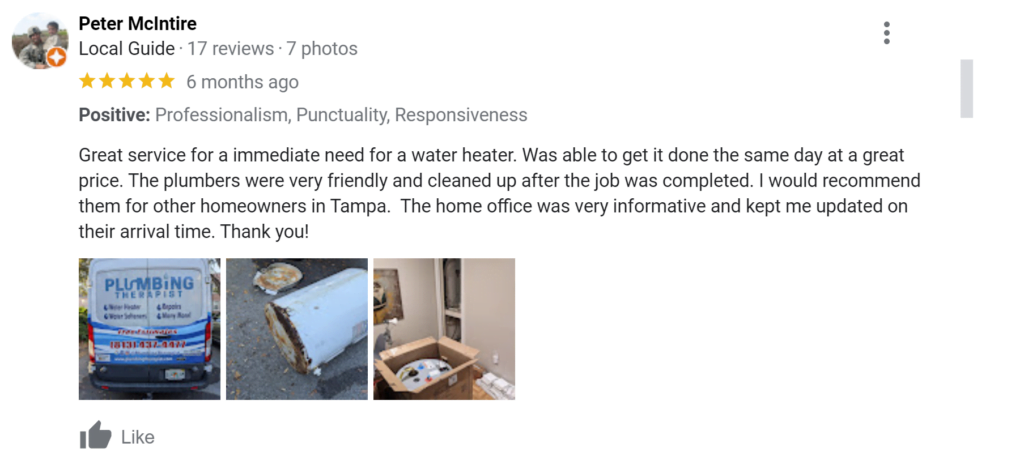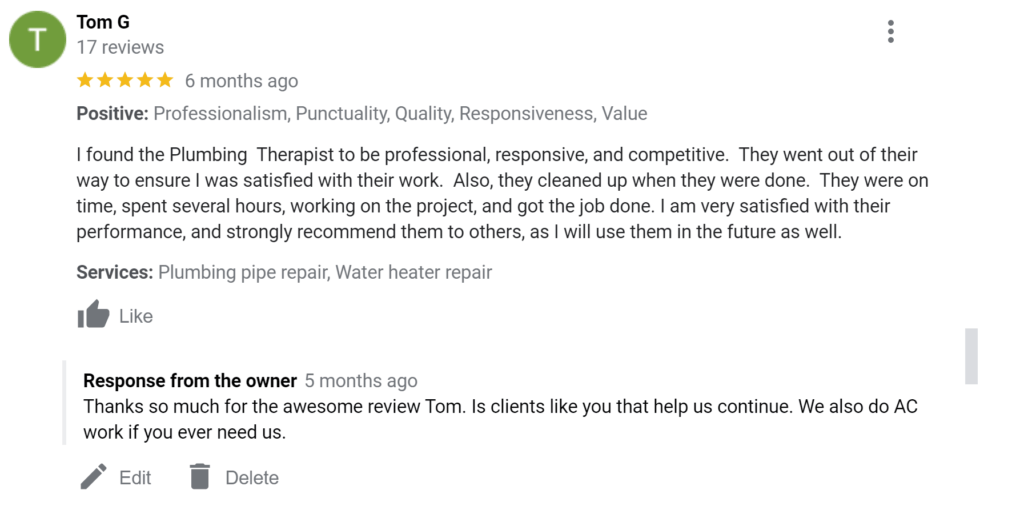Drain Cleaning
Drain cleaning, a vital service offered by Plumbing Therapist, is the process of clearing clogs and obstructions from pipes, ensuring smooth water flow and preventing plumbing issues.
Do You Need Our Help ?
Feel free to contact us now
$99 Water Heater Flush + Free Plumbing System Inspection
Drain Cleaning Service in Tampa Bay
Experience a Refreshing Difference with Plumbing Therapist's Drain Cleaning Service in Hillsborough County, Pinellas County, and Pasco County
At Plumbing Therapist, we understand the vital role clear, unobstructed drains play in your home’s functionality. Our Drain Cleaning service is the remedy for clogs, blockages, and slow drainage, ensuring your plumbing operates flawlessly.
Why Choose Plumbing Therapist for Drain Cleaning?
1. Expertise and Experience:
- Our team comprises skilled professionals with years of experience in drain cleaning.
- We’ve encountered every type of clog imaginable, from hair and soap scum to tree roots, and we know how to tackle them effectively.
2. Cutting-Edge Equipment:
- Plumbing Therapist invests in the latest plumbing technology, including powerful hydro-jetting equipment and drain cameras.
- This means faster, more efficient solutions for your drain problems.
3. Preventative Maintenance:
- We don’t just clear the current clog; we help prevent future ones with our expert maintenance tips.
- Regular drain cleaning can extend the life of your plumbing system, saving you money in the long run.
4. Eco-Friendly Solutions:
- We prioritize environmentally-friendly drain cleaning solutions, ensuring we protect your plumbing and the planet.
5. Affordable and Transparent Pricing:
- Plumbing Therapist offers competitive rates with no hidden fees.
- We provide detailed estimates before starting any work.
6. 24/7 Availability:
- Plumbing emergencies can strike at any time, so we’re available around the clock to address your drain cleaning needs.
7. Local and Trustworthy:
- As a local plumbing company, we’re committed to serving our community with honesty and integrity.
- Our many satisfied customers can attest to our reliability and dedication.

Why partner with Plumbing Therapist?
Quality, Affordability, and Expertise.

No Hidden or Unexpected Charges

Free Estimates & Online Booking Available

Professionally Trained Technicians

Honesty is Guaranteed

Quick Communication & Service Within 24 Hours

400+ 5 Star Reviews

Why does your home need drain cleaning?
At Plumbing Therapist, we recognize the critical importance of regular drain cleaning for your home’s plumbing system. Here’s why it’s a must:
1. Prevent Clogs and Blockages:
- Our Drain Cleaning service is your shield against pesky clogs caused by debris, grease, and mineral buildup. Keep your pipes free-flowing and avoid inconvenient blockages.
2. Maintain Smooth Water Flow:
- Say goodbye to sluggish drains. We ensure water flows seamlessly in your sinks, showers, and toilets, providing the convenience you deserve.
3. Avoid Costly Repairs:
- Neglected clogs can escalate into costly plumbing emergencies. With routine drain cleaning, you save money by preventing major issues down the line.
4. Banish Unpleasant Odors:
- Clogged drains often emit unpleasant odors. Our drain cleaning service not only clears the blockage but also leaves your home smelling fresh and clean.
5. Extend Your Plumbing’s Lifespan:
- Regular maintenance, including drain cleaning, extends the life of your plumbing system, protecting your home’s value and your peace of mind.
6. 24/7 Availability:
- Plumbing Therapist is here for you anytime, day or night, ready to tackle any drainage emergency that comes your way.
7. Environmentally Conscious Solutions:
- We’re committed to eco-friendly drain cleaning methods, ensuring a cleaner plumbing system and a healthier planet.
Don’t wait until a plumbing disaster strikes. Contact Plumbing Therapist today and experience the transformative power of drain cleaning. Trust our expertise to provide your home with the plumbing therapy it deserves.
If you would like more information, feel free to give them a call at (813)-437-4477 or you can book online and get their latest discount!
Customer Testimonials: Real Experiences with Plumbing Therapist
We proudly share the experiences and stories of our valued clients. Their feedback provides a glimpse into the quality of service and commitment to excellence we uphold at Plumbing Therapist. You'll read firsthand how our plumbing solutions have improved comfort and efficiency in homes across Tampa Bay. These testimonials illustrate our dedication to customer satisfaction and the difference our expert services can make.




Your questions answered
Common Drain Cleaning Questions:
What is drain cleaning, and why is it necessary?
Drain cleaning is a plumbing service aimed at removing clogs, blockages, and debris from your home’s drainage pipes and sewer lines. It involves various techniques and tools to ensure that water can flow freely through the plumbing system.
Why is drain cleaning necessary?
Preventing Clogs: Over time, debris like hair, soap scum, food particles, and grease can accumulate in your drains, leading to clogs. Drain cleaning prevents and removes these blockages.
Maintaining Smooth Water Flow: Clogs and blockages can cause water to drain slowly or back up, leading to inconvenience and potential damage.
Preventing Odors: Clogged drains can emit foul odors due to trapped organic matter. Drain cleaning helps eliminate these unpleasant smells, keeping your home fresh.
Preventing Plumbing Emergencies: Neglected clogs can escalate into more severe plumbing issues, such as burst pipes or sewer backups, which can be costly to repair. Regular drain cleaning is a preventive measure to avoid such emergencies.
Extending Plumbing Lifespan: Regular maintenance, including drain cleaning, can extend the lifespan of your plumbing system, saving you money on repairs and replacements.
How often should I schedule drain cleaning for my home?
The frequency of scheduling drain cleaning for your home can depend on several factors, including your household’s habits and the age of your plumbing system. Here are some general guidelines to consider:
1. Regular Maintenance: It’s advisable to have a professional drain cleaning service performed annually as part of your home’s regular maintenance routine. This helps prevent the accumulation of minor clogs and ensures that your drains and pipes remain in good condition.
2. High Usage Areas: If you have specific drains that receive heavy use, such as the kitchen sink, bathroom shower, or laundry room, consider more frequent cleaning for these areas. Semi-annual or quarterly cleanings may be appropriate, depending on the level of usage.
3. Older Plumbing: If your home has older plumbing pipes, they may be more prone to buildup and clogs. In such cases, more frequent drain cleaning, such as every six months, can be beneficial to maintain plumbing health.
4. Signs of Trouble: Pay attention to signs of drainage issues. If you notice slow draining sinks or toilets, gurgling sounds, or foul odors coming from your drains, it’s a sign that you should schedule a cleaning sooner rather than later.
5. Preventative Approach: Some homeowners choose to schedule drain cleaning more frequently as a preventative measure, especially if they have had plumbing problems in the past. This can help avoid unexpected clogs and backups.
Ultimately, the best schedule for drain cleaning depends on your specific circumstances. Consulting with a professional plumber can provide personalized recommendations based on your home’s plumbing system and usage patterns. Regular maintenance is key to preventing major plumbing issues and maintaining a smoothly functioning plumbing system.
What are the signs that my drains need cleaning?
Recognizing the signs that your drains need cleaning is crucial to addressing plumbing issues before they escalate. Here are common signs that indicate it’s time for drain cleaning:
Slow Drainage: If water is slow to drain from your sink, bathtub, shower, or toilet, it’s a strong indicator of a partial blockage in the drainpipe.
Gurgling Sounds: Unusual gurgling or bubbling sounds coming from your drains when you use water fixtures may suggest air trapped in the pipes due to an obstruction.
Foul Odors: Foul or sewage-like odors emanating from your drains are often caused by trapped food debris, soap scum, or other organic matter in the pipes.
Water Backups: Frequent backups in sinks, bathtubs, or toilets, where water or sewage comes back up, are clear signs of a significant blockage.
Multiple Clogs: If you’re experiencing clogs in multiple drains throughout your home simultaneously, it could indicate a more extensive issue within your plumbing system.
Fruit Flies or Drain Flies: The presence of fruit flies or drain flies near your drains is often linked to organic matter buildup in the pipes, which serves as a breeding ground for these insects.
Toilet Bubbling: When flushing a toilet causes water to bubble up in nearby drains or fixtures, it’s a sign of a blockage in the main sewer line.
High Water Bills: A sudden increase in your water bills without a clear explanation could be due to a hidden leak or continuous water flow caused by a blocked drain.
Visible Debris: In some cases, you may notice visible debris, hair, or food particles accumulating in your drain, indicating the need for cleaning.
Recurring Issues: If you’ve had previous drain issues that were temporarily resolved but keep coming back, it’s a sign that the underlying problem hasn’t been completely addressed.
If you notice any of these signs, it’s advisable to schedule professional drain cleaning promptly. Ignoring these warning signals can lead to more severe plumbing problems and potentially costly repairs in the future.
What are the potential risks of neglecting drain cleaning?
Neglecting drain cleaning can lead to various potential risks and consequences for your plumbing system and your home. Here are some of the risks associated with neglecting drain cleaning:
Clogs and Blockages: Over time, debris like hair, soap scum, grease, and food particles can accumulate in your drains. Neglecting cleaning allows these substances to build up, leading to clogs and blockages that impede water flow.
Slow Drainage: Partial clogs can result in slow drainage from sinks, showers, bathtubs, and toilets, making daily tasks inconvenient and time-consuming.
Backups and Overflows: Clogs that are left unaddressed can cause backups, where water or sewage returns up the drains. This can lead to messy and unsanitary overflows in your home.
Plumbing Emergencies: Neglected drain issues can escalate into plumbing emergencies, such as burst pipes, sewage backups, or water damage to your home’s structure and belongings. These emergencies are not only costly to repair but also disruptive to your daily life.
Foul Odors: Clogged drains can emit foul odors due to trapped organic matter, creating an unpleasant living environment.
Damage to Pipes: The pressure from clogs and blockages can damage your plumbing pipes over time, leading to leaks, cracks, and the need for extensive repairs or replacements.
Reduced Lifespan of Plumbing System: Neglecting drain cleaning can accelerate wear and tear on your plumbing system, shortening its lifespan and requiring premature replacements.
Mold and Mildew Growth: Standing water from drain backups or slow drainage can create a conducive environment for mold and mildew growth, which can be harmful to your health and require remediation.
Increased Water Bills: Clogged drains can lead to continuous water flow, resulting in higher water bills due to wasted water.
Inconvenience and Disruption: Dealing with plumbing issues and repairs can be highly inconvenient, disrupting your daily routines and causing stress.
Can regular drain cleaning help prevent plumbing emergencies?
Yes, regular drain cleaning can play a significant role in preventing plumbing emergencies. Here’s how:
Preventing Clogs: Routine drain cleaning removes debris, grease, and mineral buildup from your pipes. By keeping your drains clear, it reduces the chances of clogs that can lead to blockages and backups.
Early Detection: During regular drain cleaning, plumbers may identify potential issues, such as damaged pipes or tree root intrusion, before they escalate into emergencies. Addressing these concerns promptly can prevent more extensive problems.
Maintaining Pipe Health: Drain cleaning helps maintain the health of your plumbing pipes. Over time, neglecting cleaning can lead to pipe corrosion, cracks, and leaks, which can result in water damage and costly repairs.
Preventing Burst Pipes: Clogs and blockages can increase pressure within your pipes. This elevated pressure can lead to burst pipes, causing extensive water damage to your home. Regular drain cleaning reduces the risk of such pressure-related emergencies.
Preventing Sewage Backups: Clogged drains can cause sewage backups, which are not only unsanitary but also pose significant health hazards. Regular cleaning helps prevent these backups, ensuring a safer living environment.
Minimizing Water Damage: Plumbing emergencies often involve water damage to your property. By preventing clogs and backups through regular cleaning, you reduce the risk of costly water damage restoration.
Preserving Home Value: Plumbing emergencies can impact the value of your home and lead to costly repairs during resale inspections. Regular maintenance, including drain cleaning, helps maintain your property’s value.
Are there any maintenance tips to keep drains clear between professional cleanings?
Certainly! There are several maintenance tips you can follow to help keep your drains clear between professional cleanings. These practices can help prevent minor clogs and maintain the health of your plumbing system:
Use Drain Strainers: Install drain strainers or stoppers in sinks, showers, and tubs to catch hair, food particles, and other debris before they enter the drain. Regularly clean and empty these strainers.
Dispose of Grease Properly: Avoid pouring grease, cooking oils, and fats down the kitchen sink. Instead, collect them in a container and dispose of them in the trash once they solidify.
Run Hot Water: After using the kitchen sink or any drain, run hot water for a few minutes to help flush away small particles and prevent them from sticking to the pipes.
Regularly Clean Drains: Periodically, flush your drains with a mixture of hot water and vinegar or baking soda. This can help break down buildup and keep drains smelling fresh.
Avoid Overloading Garbage Disposals: Use your garbage disposal sparingly and avoid putting large amounts of food scraps down the drain at once. Always run cold water while using the disposal.
Flush with Cold Water: When using the garbage disposal, use cold water rather than hot water. Cold water helps prevent grease and food particles from solidifying and clinging to the pipes.
Don’t Flush Non-Biodegradable Items: Avoid flushing non-biodegradable items like baby wipes, paper towels, sanitary products, and cotton balls down the toilet. Only flush toilet paper.
Regularly Maintain Septic Systems: If you have a septic system, follow the recommended maintenance schedule to avoid septic backups, which can affect your drains.
Be Mindful of Chemical Cleaners: Avoid using harsh chemical drain cleaners regularly, as they can damage your pipes over time. Opt for natural or enzymatic drain cleaners when necessary.
Schedule Professional Inspections: Even if you’re diligent with maintenance, it’s still essential to schedule professional drain inspections and cleaning as part of routine plumbing maintenance.
Address Minor Issues Promptly: If you notice slow drainage or minor clogs, address them promptly using a plunger or a drain snake. Avoid using excessive force, which can damage pipes.
By incorporating these maintenance tips into your routine, you can help keep your drains clear and reduce the frequency of professional cleanings. However, it’s essential to have periodic professional inspections and cleaning to address deeper issues and ensure the long-term health of your plumbing system.
